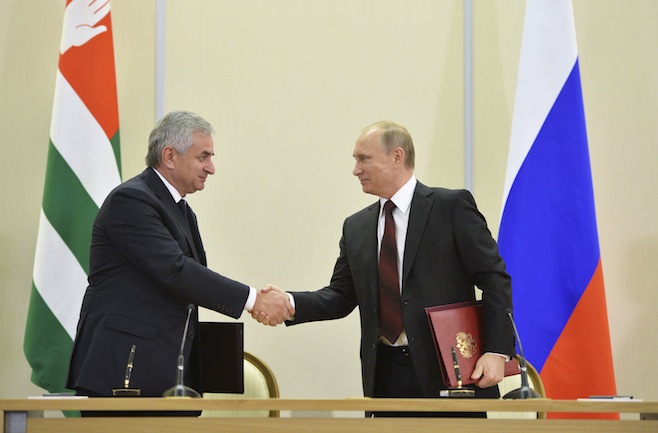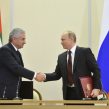
Looming Annexations of Abkhazia and South Ossetia, and Russia’s Growing Appetite for Territorial Expansion
Publication: Eurasia Daily Monitor Volume: 11 Issue: 210
By:

On November 20, Russian-occupied South Ossetia’s (Tskhinvali region) separatist regime declared that it is negotiating a new “comprehensive agreement on integration” with Russia, which will raise the relationship between the two sides to a “qualitatively new level,” especially in the military sphere (regnum.ru, November 20). Although the full text of the “agreement” has not yet been revealed, it is all but clear that Russia is readying to lock South Ossetia in the same type of treaty that it had already forced on breakaway Abkhazia. This effectively sets the stage for the final annexation of both of these Georgian regions.
Earlier in October, Moscow unveiled the “Agreement on Alliance and Integration” between Russia and Abkhazia. The treaty envisages a gradual, but ultimate merger of Russian-occupied Abkhazia’s defense, security, law enforcement, border, customs, economic and healthcare agencies with that of Russia’s within three years (apsnypress.info, October 13; see EDM, October 29).
The Russian-proposed agreement represented such a blatant attempt to annex Abkhazia into the Russian Federation that even the routinely obedient Abkhazian separatists dared to protest. For instance, the Public Chamber of Abkhazia as well as another Sukhumi-based organization, Ainar, warned of the negative consequences that this treaty could have for Abkhazia’s “sovereignty” in the future (Civil Georgia, November 23). After weeks of deliberations and negotiations, Abkhazia’s separatist “parliament” and the “government” achieved no meaningful compromises, except for changing the name of the treaty from the “Agreement on Alliance and Integration” to the “Agreement on Alliance and Strategic Partnership” (Civil Georgia, November 22). The treaty was signed on November 24, thus effectively turning Abkhazia into a Russian protectorate (Rustavi 2, November 24).
South Ossetia will soon also share Abkhazia’s fate, making it plainly clear for Abkhazian and Ossetian separatists that their 25-year illusion of “national independence” and “sovereignty,” promised by Russia, was nothing more than skillful deception by the Kremlin. These integration treaties are the first steps. The next ones will be the two regions’ eventual annexation into Russia over the coming years.
Notably, Russia’s transformation—from the small city state of Moscow (Muscovy), surrounded with flimsy wooden fortifications, to a continental empire, armed with about two thousand nuclear warheads—did not happen overnight. It was a long, gradual process whereby Russia’s expansionist and aggressive rulers slowly, but surely, wore down their neighbors, step by step incorporating them into the growing Russian empire. Historically, the first step was always to turn its neighboring lands and nations into protectorates—something between a vassal and a sovereign nation—and finally into mere provinces of the empire. This pattern has not changed, and clearly continues today.
However, the effects of the trend at play here, which has been highlighted by several other recent examples, will, in all likelihood, be felt beyond Georgia, bringing deeply negative and far-reaching consequences for the wider region as well as the Transatlantic community. Specifically, if a new integration treaty with Abkhazia (hence, its de facto annexation) initially looked like an isolated case for some, another prospective integration treaty with South Ossetia (also implying its de facto annexation) fully reveals Moscow’s modus operandi. Evidently, Moscow always wanted to incorporate both of these Georgian regions, which is why it launched a full-scale war against Georgia in August 2008. But it bears noting that Russia moved forward with these integration treaties only after its successful annexation of Crimea in the spring of 2014, and then the increasingly ferocious war in eastern Ukraine, in which Moscow has been trying to slice even more territory from the country. Most importantly, all of these took place, and continue, against the background of the West’s largely muted reaction, which Moscow naturally took note of. In other words, Russia’s earlier successes in Ukraine have apparently contributed to Moscow’s newly reinvigorated appetite for territorial expansion in the South Caucasus.
The bigger problem, however, is that this process may not stop in Georgia and Ukraine. Aside from Moldova, Russia may well test the West’s readiness to defend NATO members Estonia, Latvia and Lithuania in the foreseeable future. Russia’s territorial pretensions toward the Baltic States are long-known, after all. And the widely held belief that Western economic sanctions on Russia will eventually work and wear out the current Russian regime is ill-conceived and highly dangerous. So far, sanctions have failed to curtail Russia’s behavior. Quiet to the contrary, they seem to have been taken as a sign of weakness by Russia and fed its growing appetite for territorial expansion. As the war in Ukraine gradually fades from the international headlines and the annexation of Crimea becomes a forgotten story, the West might soon find itself searching for more workable ways to contain Russia’s awakened expansionism.




